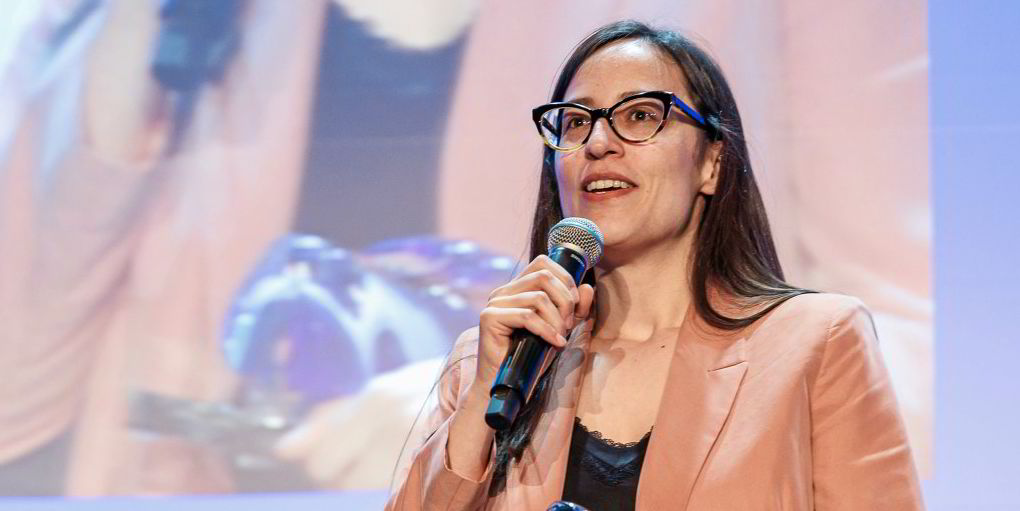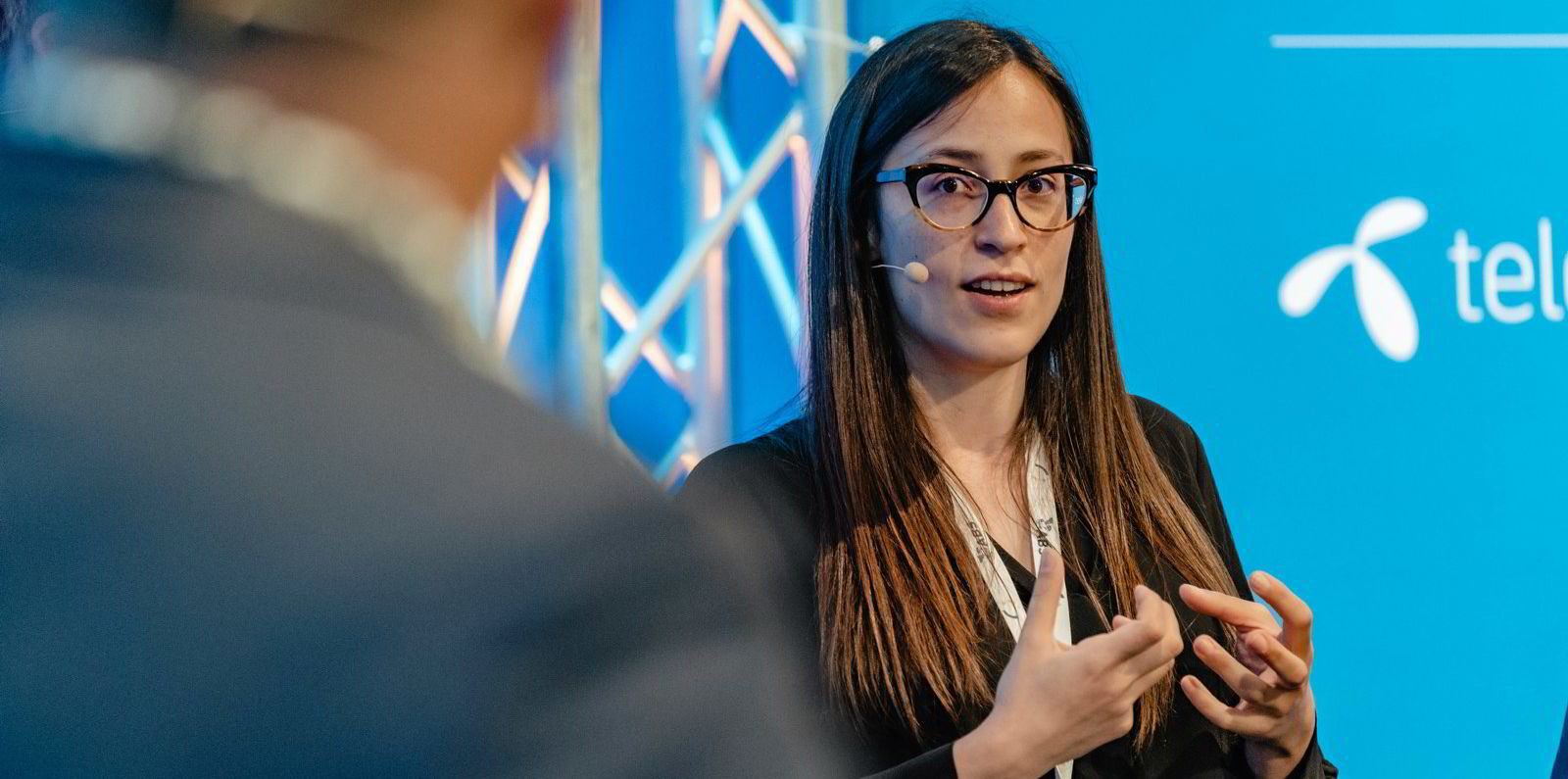Cristina Munoz never imagined that she would become an engineer, never dreamed of working in shipping and certainly had never pictured that she would run a business one day.
Today, she is a self-described “engineer at heart” and co-founder of Bound4Blue, a startup that has developed wind-assisted suction sails designed for the clean propulsion of vessels. As chief operating officer, she oversees the company’s commercial direction.
Growing up in Spain, her dream was simple. All she wanted to do was change the world.
“I wanted to become a doctor when I was a child because what I really knew is that I wanted to generate an impact,” she told TradeWinds.
But everything changed following an unexpected conversation with a teacher, who encouraged her to pursue a career in engineering.
“She really told me how real engineers are involved in saving lives and in making this world a better place,” Munoz recalled. “Basically my motivation was there, I could really do what my mission was, what I really intended to do, through engineering.”
She chose to specialise in aeronautics — “not because I loved aeroplanes or space shuttles, but because of my love of solving problems” — which ultimately led Munoz and two of her classmates to maritime, when they realised the industry was struggling to find ways to reduce the fuel consumption of vessels.
“For us, it was very obvious,” she said. “We had been studying aeroplane wings for a lot of years. It was like, ‘Ok, that’s obvious. Let’s put aeroplane wings on ships to propel them’.”
This initial approach changed as research and development (R&D) work got underway and the team ultimately chose to focus on designing suction sails, the technology that Bound4Blue is commercialising today.
Munoz convinced classmates Jose Miguel Bermudez and David Ferrer to found Bound4Blue with her in 2014. Today, Bermudez is chief executive and Ferrer is chief technical officer.
The company’s first round of fundraising was completed in 2015 but the early days were tough and the organisation struggled to appeal to venture capital funds. (“Basically, we weren’t a sexy business for them,” Munoz said.)
Attracting talent was difficult too because it was hard to recruit the right people to a company that at that time was simply based on an idea — an idea that also faced resistance from the shipping sector itself.

“We went to the industry and we knew that wind propulsion could be part of the solution,” she said. “But we were treated as crazy at that time.”
But from Bound4Blue’s perspective, the crazy ones were some of the people they encountered in shipping.
“We told them, ‘Okay, we want to build a wind propulsion system to solve this problem. How do you see it? What are the characteristics that it should have?’,” Munoz said. “And some of them were saying very strange things like, ‘If the payback is 15 years, it’s okay’. Then others were saying one year. It was like, ‘Okay, we’re getting really weird answers here’.
Cristina Munoz does not look to the shipping industry when she needs inspiration. She heads to the gym or the kitchen.
“I think that new ideas come from outside your own business,” she said.
“Ideas for me at least — new business models and new ways of marketing the product — I get that from outside shipping, like different ways others have done it and that I think could be applied with a twist to Bound4Blue and to shipping.
“It’s not because there’s no innovation in shipping or nobody who’s inspiring in shipping — there is — but because I’m so much involved with that all of the time.”
It is not just about breaking out of the shipping-focused mindset. Creativity and inspiration often hit when Munoz physically escapes her working life, even if it is just for a few hours.
“When I’m very stressed, I go to the gym, then I go back and I have ideas,” she said.
“Then it’s changing what really makes me be more creative. I love pastry. For instance, when I go to the kitchen, I do something, I cook, then I have ideas.
“But being all of the time involved in [day-to-day work], really, maybe you’re looking at the problem always with the same point of view, directly from inside.”
“Basically, we had to develop first time the technology with their help — but not with that much help, because they weren’t intending to spend that much time and energy on us. So that was also difficult times to see what the hell I have to really develop and implement.”
Interest in Bound4Blue’s design concept received a boost just before the IMO 2020 regulations entered into force, as vessel pollution came under fresh scrutiny and shipping companies scrambled to cut their SOx emissions.
After that, Bound4Blue began to bloom. Having been a “bullfighter” (her word) in the early days — doing a bit of everything, all of the time — Munoz moved away from the company’s technical activities to focus on the firm’s commercial activities.
Munoz wants to prove that shipping can decarbonise and cut its emissions using wind power.
“It’s unimaginable that we have an infinite and renewable resource that we are not using wisely,” she said. “Of course, we need alternative fuels. I don’t ever say that sails will be the only solution for shipping — it’s part of the solution.”
Munoz hopes that opting for wind propulsion will become standard in the future, but said shipowners will need help. Vendors such as Bound4Blue need to ensure sails are attractive by making them cost-effective. Owners will also need help with securing finance.
“Around 80% of the fleet could benefit from this type of technology,” she said. “Of course, not all 80% of the fleet will implement it in the next five years, but we hope a big bunch of those ships will be installed [with sails] and, in fact, what we’re seeing in the orderbook is that it’s growing exponentially.”
The next challenge for Bound4Blue is to make sure it has the capacity to handle the influx of new orders it anticipates. The company has partnered with a European manufacturer of wind-turbine towers, enabling the supply of around 1,500 sails per year from just one of its manufacturing facilities.
Suction sails have already been ordered by two major customers: French owner Louis Dreyfus Armateurs (LDA) and Marubeni Corp of Japan.
LDA has ordered three 22.5-metre sails, which have been fabricated and will be fitted onboard this year, while Marubeni has ordered four 36-metre sails for a panamax bulker, which will be installed this year or in 2024.
Two 17-metre sails were retrofitted on an Amasus Shipping multipurpose vessel in June.
Munoz said other installations will be announced in the near future for shipowners based in Europe and Asia.
“We’re very happy to see the market really adopting and demanding this type of technology so we’re preparing on that side — installing more units per ship, going to larger sizes of the fleet, different types of ships,” she said.
But given that Munoz’s career has been so driven by her personal values and desire to make a difference, would her younger self be proud?
“Young Cristina, I’m not sure if she would be so, so proud because really she wanted to change all of the world,” she said. “When I grew up, I knew that I had to choose just one of my battles and fight for that battle. Changing the whole world is very difficult.
“I will always use this example. I got the representative from an NGO [non-governmental organisation] telling me that I shouldn’t install my sails on those ships that pollute a lot because blah, blah, blah. Okay, girl, where does the energy you’re using come from? The clothes you’re wearing? Really, we need shipping.
“Of course, I’m not solving all of their problems. I’m not giving 100% of the energy that the ship needs, but we should start. Not starting is not a solution.”
For Munoz today, it is not so much about changing the world as it is about stepping up and getting involved in doing the right thing.
“I never envisioned myself in shipping,” she said. “I thought we could give a solution with our approach and with our knowledge. I didn’t think twice, I just stepped in.”
Cristina Munoz holds both a bachelor’s and master’s degree in aeronautical engineering, specialising in propulsion, from the Polytechnic University of Catalonia. She also has an executive master of business administration from IESE Business School at the University of Navarra, Spain.
She was recognised at this year’s Nor-Shipping event in Norway, where she was given the Young Entrepreneur award by a jury of senior maritime leaders. She was also named one of YoungShip Oslo’s 10 Women to Watch. But these are only the two most recent awards with which she has been recognised.
Honours and awards associated with Bound4Blue
- 10 Women to Watch in Shipping, awarded by YoungShip Oslo, June 2023
- Nor-Shipping Young Entrepreneur Award, June 2023
- IESE 40 Under-40 recognition and Outstanding Female Entrepreneur award 2022 — both issued by IESE Business School.
- The Talgo Award for Professional Excellence for Women in Engineering 2022, awarded by Spanish train manufacturer Talgo.
- Young Entrepreneur of the Year 2022, Seatrade Maritime awards.
- Inspirational Female Founders of Ocean & Energy 2022, awarded by The Ocean Opportunity Lab.
- Women in Tech Global Start-up Award 2021, issued by Women in Tech.
- EIT Woman Award Winner 2020, awarded by the European Institute of Innovation & Technology.
- Innovation and Female Entrepreneurship Award 2020, awarded by the Federacion Espanola de Mujeres Directivas, Ejecutivas, Profesionales y Empresarias).
- Recognised as a “Yo, Jefa” success story in the 2019 edition of “Yo, Jefa” census, which focused on the Spanish entrepreneurial ecosystem, issued by Trescom Comunicacion.
- Forbes 30 Under 30 award — Europe, 2019
- EU Top 50 Entrepreneurs 2017, a competition organised by Knowledge4Innovation.




